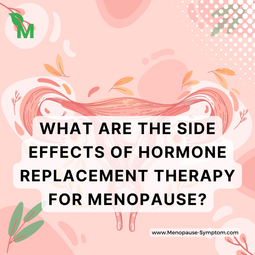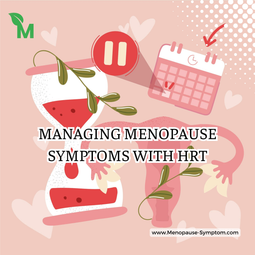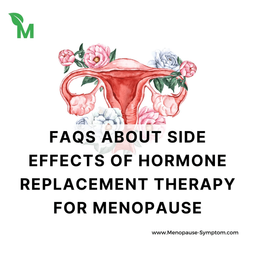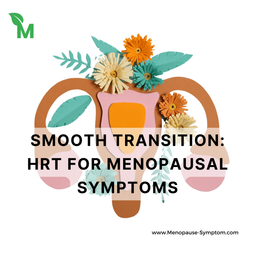HRT Side Effects: What Menopause Women Need To Know. Risks And Benefits
On
05/11/2024Reading time:
5 min
Summary:
Discover the potential side effects of hormone replacement therapy for menopause. Learn about risks, benefits, and alternative options to make informed decisions about your health and well-being.
Navigating the HRT Landscape: Essential Knowledge for Menopausal Women
The HRT Dilemma: Weighing the Pros and Cons
Hormone Replacement Therapy (HRT) has been a topic of intense discussion and debate among menopausal women for decades. As you navigate this complex landscape, it's crucial to understand both the potential benefits and the side effects of hormone replacement therapy for menopause. Whether you're a long-time user or considering HRT for the first time, this comprehensive guide will provide you with the information you need to make an informed decision about your health.
Understanding HRT: A Brief Overview
Before delving into the side effects, let's briefly recap what HRT entails. Hormone Replacement Therapy is a treatment used to alleviate symptoms of menopause by supplementing the body with estrogen and, in some cases, progesterone. These hormones can be administered in various forms, including pills, patches, gels, and creams.
Types of HRT
Estrogen-only therapy (ET)
Combined estrogen-progestogen therapy (EPT)
Bioidentical hormone therapy
Each type of HRT has its own set of potential benefits and risks, which we'll explore in detail.
The Benefits of HRT: Why Women Consider This Option
Many women turn to HRT for relief from debilitating menopausal symptoms. Let's examine some of the potential benefits that make HRT an attractive option:
1. Alleviating Hot Flashes and Night Sweats
One of the most common and troublesome symptoms of menopause is hot flashes. HRT has been shown to significantly reduce the frequency and intensity of these sudden heat surges, providing much-needed relief for many women.
2. Improving Vaginal Health
Vaginal dryness, itching, and discomfort during intercourse are common complaints during menopause. HRT can help restore vaginal moisture and elasticity, making these issues less problematic.
3. Preserving Bone Density
Estrogen plays a crucial role in maintaining bone density. As estrogen levels decline during menopause, the risk of osteoporosis increases. HRT can help slow bone loss and reduce the risk of fractures.
4. Potential Cognitive Benefits
Some studies suggest that HRT may have protective effects on cognitive function, potentially reducing the risk of dementia when started early in menopause.
5. Mood Stabilization
Hormonal fluctuations during menopause can lead to mood swings, irritability, and even depression. HRT may help stabilize mood and improve overall emotional well-being.
The Side Effects of Hormone Replacement Therapy for Menopause
While the benefits of HRT can be significant, it's crucial to understand the potential side effects and risks associated with this treatment. Let's examine these in detail:
1. Increased Risk of Breast Cancer
One of the most concerning side effects of hormone replacement therapy for menopause is the potential increase in breast cancer risk. This risk appears to be higher with combined estrogen-progestogen therapy compared to estrogen-only therapy.
Studies have shown that the risk of breast cancer increases with the duration of HRT use, particularly after 5 years of continuous treatment.
It's important to note that the absolute risk remains relatively small, but it's a factor that should be carefully considered, especially for women with a family history of breast cancer.
2. Cardiovascular Risks
The relationship between HRT and cardiovascular health is complex and depends on various factors, including the woman's age and the timing of HRT initiation.
Stroke: HRT may slightly increase the risk of stroke, particularly in older women or those who start therapy later in menopause.
Blood Clots: There is an increased risk of blood clots, especially deep vein thrombosis (DVT) and pulmonary embolism, associated with oral HRT.
Heart Disease: The effect of HRT on heart disease risk is less clear and may depend on when treatment is started.
3. Endometrial Cancer Risk
For women who have not had a hysterectomy, taking estrogen alone (without progesterone) can increase the risk of endometrial cancer. This is why combined HRT is typically recommended for women with an intact uterus.
4. Gallbladder Disease
HRT has been associated with an increased risk of gallbladder disease, including gallstones and the need for gallbladder surgery.
5. Common Short-Term Side Effects
In addition to the more serious risks, HRT can cause several short-term side effects that may affect quality of life:
Bloating
Breast tenderness
Nausea
Headaches
Mood swings
Irregular bleeding or spotting
These side effects often subside after a few months of treatment, but for some women, they may persist and necessitate discontinuation or adjustment of therapy.
Mitigating Risks: Strategies for Safer HRT Use
While the side effects of hormone replacement therapy for menopause can seem daunting, there are several strategies that can help minimize risks:
1. Individualized Treatment Plans
It's crucial to work closely with your healthcare provider to develop a personalized HRT plan. Factors such as your age, medical history, family history, and specific symptoms should all be taken into account.
2. Using the Lowest Effective Dose
Starting with the lowest effective dose and gradually increasing if necessary can help minimize side effects and long-term risks.
3. Regular Monitoring
Frequent check-ups and screenings, including mammograms and bone density scans, are essential for early detection of any potential issues.
4. Limited Duration of Use
The risks associated with HRT tend to increase with longer durations of use. Discussing a timeline for therapy with your doctor can help balance symptom relief with long-term safety.
5. Alternative Delivery Methods
Transdermal forms of HRT (patches, gels) may carry a lower risk of blood clots compared to oral medications. Discussing these options with your healthcare provider can help identify the safest method for you.
Making an Informed Decision: Factors to Consider
As you weigh the benefits and side effects of hormone replacement therapy for menopause, consider the following factors:
Severity of Menopausal Symptoms: How much are your symptoms affecting your quality of life?
Personal Health History: Do you have any pre-existing conditions that might increase your risk?
Family Medical History: Is there a history of breast cancer, heart disease, or other relevant conditions in your family?
Age and Time Since Menopause: The risks and benefits of HRT can vary depending on your age and how long it's been since your last period.
Lifestyle Factors: Are there non-hormonal strategies you could adopt to manage your symptoms?
Alternatives to HRT: Exploring Other Options
For women who are unable or unwilling to use HRT due to the potential side effects, several alternatives are available:
Lifestyle Modifications
Regular exercise
Stress reduction techniques (meditation, yoga)
Dietary changes (reducing caffeine and alcohol intake)
Maintaining a healthy weight
Non-Hormonal Medications
Selective serotonin reuptake inhibitors (SSRIs) for hot flashes and mood symptoms
Gabapentin or pregabalin for hot flashes and sleep disturbances
Ospemifene for vaginal dryness and painful intercourse
Complementary and Alternative Therapies
Herbal remedies (black cohosh, red clover)
Acupuncture
Cognitive behavioral therapy
While these alternatives may not be as effective as HRT for some women, they can provide relief with potentially fewer risks.
The Importance of Ongoing Research
Our understanding of the benefits and side effects of hormone replacement therapy for menopause continues to evolve. Ongoing research is crucial for refining treatment strategies and improving outcomes for menopausal women.
Recent studies have suggested that the timing of HRT initiation may play a crucial role in determining its risks and benefits, with earlier initiation potentially offering more favorable outcomes.
As an informed patient, staying up-to-date with the latest research can help you make the best decisions for your health in collaboration with your healthcare provider.
Conclusion: Empowering Your Menopause Journey
Navigating the complex landscape of HRT requires careful consideration of both the potential benefits and the side effects of hormone replacement therapy for menopause. While HRT can offer significant relief from menopausal symptoms and provide long-term health benefits, it's not without risks.
By staying informed, maintaining open communication with your healthcare provider, and regularly reassessing your treatment plan, you can make empowered decisions about your health during this transitional period of life. Remember, there is no one-size-fits-all approach to managing menopause, and what works best for you may evolve over time.
As you consider your options, don't hesitate to seek second opinions, explore alternatives, and advocate for your health. With the right information and support, you can navigate menopause with confidence, making choices that align with your individual needs, values, and health goals.
Source: Team MPS compiled, analyzed and wrote. Please dont reup without source of us. Many thanks.
Hormone replacement therapy (HRT) can effectively manage menopause symptoms, but it's crucial to understand its potential side effects. From common issues like weight gain to more serious risks such as breast cancer, this guide explores the impacts of HRT on your body and offers insights to help you make informed decisions about your menopausal health.




